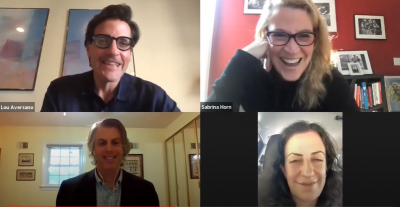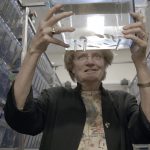Guidance can be hard to come by when the world continues to bring forth unprecedented challenges. Communications specialists, however, are no strangers to solving unconventional problems.

A panel of Boston University alumni and media experts affirmed the need for optimism and adaptability in the communications industry during a virtual discussion Wednesday, presented by the College of Communication.
Lou Aversano, a 1988 Questrom School of Business graduate, moderated the event, entitled, “The Future of the Communications Industry.” The panel featured COM alumni Sabrina Horn, Hallie Johnston and David Jacobson, and was broadcast over Zoom to an audience of BU students, faculty and fellow alumni.
The discussion and subsequent question-and-answer segment focused on the rate of change and the effects of the pandemic as well as public trust in the media, offering advice for students and recent graduates.
COM Dean Mariette DiChristina opened the event with a brief description of each panelist’s connection to BU, their professional background and current work in the field. In an interview, DiChristina said alumni continue to influence the school’s programs after they have graduated.
“Communication is always looking forward to the future, and the alumni who’ve left COM are the ones pioneering that leading edge,” DiChristina said. “Everyone I speak to is always saying they would love to engage more with students, and the students feel the same way about the alums, because they learn from them.”
The panel offered viewers insight into current trends in advertising, public relations and journalism, and panelists offered their thoughts on what will drive the industry in the era of COVID-19 and beyond.
A common theme in the industry today, panelists said, involved both professionals and new members of the workforce diversifying their skills and job prospects, as well as considering several avenues of specialization.
Jacobson, a communications strategist for Moody’s Investors Service, said many of the journalists he works with, who once covered the financial sector, have begun to join companies they once reported on. Jacobson said this reflected a general shift in employment opportunities.
“We’re all aware of how dire the state of journalism is,” Jacobson said during the event. “It’s interesting, they have actually gone in-house, not to an in-house public relations agency, which is where they used to go, but they’re actually now working for the companies they used to cover, doing branded content.”
Johnston, the chief client officer at media agency Initiative, said the key for young professionals dealing with this kind of change in the industry is to keep their options open and gain as much varied experience as possible.
“We’re looking for diverse candidates that are coming into our company and into our agency. We’re not necessarily looking for, ‘I interned two years at an advertising agency,’” Johnston said during the discussion. “Don’t feel like you necessarily have to look for a job that is only what you studied or what you interned at.”
The panel also discussed the importance of demands that new workers make of their future employers — as companies and brands look inward to reevaluate what their core values are, applicants should ask the same questions of their prospective employers.
Sabrina Horn, CEO of HORN Strategy LLC, said she expects to see a greater emphasis on what these organizations stand for as well as what their internal cultures look like.
“A lot of companies and executive teams and leaders are having to revisit their values right now, or refresh them,” Horn said in an interview. “The companies that you associate yourself with and that you get a paycheck from, or that you sell for or represent, or whatever the job is, that connection and that affiliation is more important now than ever.”
Internal evaluation is only part of the challenge for experts today, Horn said. For the general public, media over-consumption and wavering trust has given many people media and news fatigue.
About 66 percent of Americans are worn out by the amount of news they receive and consume regularly, according to statistics published February by the Pew Research Center. To reduce this fatigue, Horn discussed the need for brands to be extremely clear in their messaging in an age of media overload, while Jacobson discussed the value of finding reputable sources to engage with over social media channels.
A poll of the panel’s audience members found the majority of respondents felt somewhat or very optimistic about the future of communications, and felt that technology would be the greatest force of change for the industry in the years to come.
DiChristina said she agreed with that view, especially for the current generation of students.
“It’s always been important in communication to be adaptable,” DiChristina said in the interview. “And one of the things that is a positive … for the students is they are using the skills right now and developing the skills right now that these companies need to deal with the future.”
For media agencies, technology has created new avenues for advertising to reach consumers where they are, Johnston said, and college graduates have a great deal of experience in those mediums, especially social media.
Johnston said she has noticed more brands coming to her company for digital and automated advertising services, seeking a more rapid connection with consumers they may not have the talent to accomplish in-house.
For Horn, in a time of advancement and uncertainty, the onus is on communication professionals to adapt their respective companies and brands to meet current demands.
“We find the truth, we communicate the truth and we provide a path forward for other people,” Horn said during the panel. “That’s our credo, in a way. We are the change agents and we make change okay for people.”
Aversano, CEO of Ogilvy and Mather, also talked about the opportunities that exist for students who can adapt to change, bringing the panel to a close.
“Times are changing with speed and acceleration, but talent always finds opportunity,” Aversano said. “The more you keep your skills fresh and your mind open and your heart big, I think the job market, as it twists and turns, we’re finding employment for people from places we never had before.”




